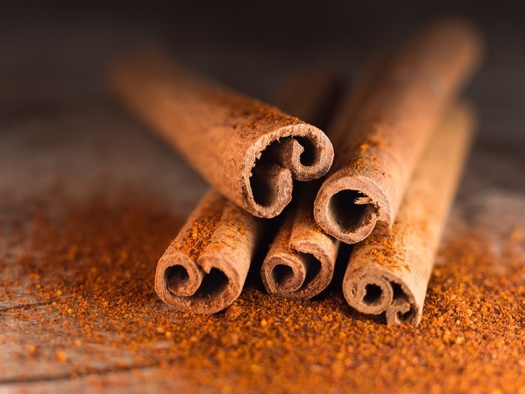CinnamonSticksAndPowder.jpg

Photo by Theo Crazzolara / Pixabay.com
Cancer rates are on the rise, and researchers are anxious to find possible alternative and herbal remedies to prevent and treat cancer. Conventional cancer treatments include chemotherapy and radiotherapy, both of which work to kill cancerous cells or arrest cancerous cell growth but have numerous negative side effects.1, 2
However, a recent study published in the European Journal of Medicinal Chemistry concluded that eugenol and cinnamaldehyde, two of the active ingredients in cinnamon, have powerful apoptotic properties that could be used to fight the growth and regeneration of cancerous cells. Researchers believe that cinnamon, widely used as a spice and flavoring agent, may be a possible preventative agent and treatment for cancer.
Cinnamon's apoptosis effects
Apoptosis is programed cell death caused by biochemical changes, and it's a normal part of cellular growth and development. However, too much apoptosis can lead to dangerous conditions including Alzheimer's and Parkinson's disease, while too little apoptosis can lead to the uncontrolled growth of abnormal cells (cancer).3
Cancerous cells are usually able to avoid apoptosis, allowing them to survive and grow rapidly. The pro-apoptotic activity of cinnamon makes it a potential inhibitory measure against cancer cell growth.4 Researchers have concluded that there are three ways in which an abnormal cell can suppress or avoid apoptosis, including:
- The impaired balance of pro-apoptotic and anti-apoptotic proteins
- A dysfunction in the ability of the cell to detect death receptor signaling
- Decreased caspase (an enzyme that initiates cellular death) activity
Cinnamon contains two compounds that may regulate these apoptotic functions:
1. Eugenol
One of cinnamon's active ingredients, eugenol both induces and regulates apoptosis in cancerous cells. Eugenol may also up-regulate the amount of caspase activity, further prompting appropriate cellular apoptosis.
In this study, pre-treatment doses of eugenol resulted in a 1.5-fold increase in the apoptotic index of cancerous cells. Finally, eugenol also works to mitigate any imbalances between the pro-apoptotic and anti-apoptotic proteins.5, 6
2. Cinnamaldehyde
Similarly to eugenol, cinnamaldehyde is an organic compound that gives cinnamon its color, flavor and smell, up-regulates pro-apoptotic proteins and down-regulates anti-apoptotic proteins. This regulation of the balance of these important proteins gives cinnamaldehyde its anti-proliferative effects on cancerous cells.7
Cinnamon suppresses tumor growth
Of significant importance is cinnamon's ability to reduce tumor growth. Essential oil of cinnamon has been shown to suppress the growth of cell factors in carcinoma cells.8 Additionally, researchers found:
"Oral or intra-tumoral injection of [cinnamon extract] to a mouse melanoma model significantly reduced tumor growth after 22 days of therapy as determined by tumor weight measurement. [Cinnamon extract] suppressed metastasis occurrence by decreasing weight and dimension of spleen drainage and lymph nodes compared to the control."9
As cancer prevalence becomes more widespread, researchers are excited at the possibility of using herbal or alternative medicinal treatments to treat and prevent cancer. That cinnamon contains such potent apoptotic and antitumor effects and is widely available is promising in the continued search for cancer treatment and prevention.
For a wider dataset of research related to cinnamon's anti-cancer properties in multiple cancer types, including lung, colon, skin, head and neck, oral, ovarian and prostate cancers, please visit GreenMedInfo.com.
References
- Jonathan EC, Bernhard EJ, McKenna WG. How does radiation kill cells?. Curr Opin Chem Biol. 1999 Feb;3(1):77-83.
- Huang CY, Ju DT, Chang CF, Muralidhar Reddy P, Velmurugan BK. A review on the effects of current chemotherapy drugs and natural agents in treating non–small cell lung cancer. Biomedicine (Taipei). 2017;7(4):23. doi:10.1051/bmdcn/2017070423.
- Elmore, Susan. Apoptosis: A Review of Programmed Cell Death. Toxicol Pathol. 2007; 35(4): 495–516.
- Kwon HK, Hwang JS, So JS, et al. Cinnamon extract induces tumor cell death through inhibition of NFkappaB and AP1 [published correction appears in BMC Cancer. 2019 Nov 14;19(1):1113]. BMC Cancer. 2010;10:392. Published 2010 Jul 24. doi:10.1186/1471-2407-10-392.
- Sadeghi S1 Davoodvandi A, Pourhanifeh MH, Sharifi N, ArefNezhad R, Sahebnasagh R, Moghadam SA, Sahebkar A, Mirzaei H. Anti-cancer effects of cinnamon: Insights into its apoptosis effects. Eur J Med Chem. 2019 Sep 15;178:131-140.
- Kwon HK, Hwang JS, So JS, et al. Cinnamon extract induces tumor cell death through inhibition of NFkappaB and AP1 [published correction appears in BMC Cancer. 2019 Nov 14;19(1):1113]. BMC Cancer. 2010;10:392. Published 2010 Jul 24. doi:10.1186/1471-2407-10-392.
- Duessel S, Heuertz RM, Ezekiel UR. Growth inhibition of human colon cancer cells by plant compounds. Clin Lab Sci. 2008 Summer;21(3):151-7. PMID: 18678136.
- Yang XQ, Zheng H, Ye Q, Li RY, Chen Y. Essential oil of Cinnamon exerts anti-cancer activity against head and neck squamous cell carcinoma via attenuating epidermal growth factor receptor - tyrosine kinase. J BUON. 2015 Nov-Dec;20(6):1518-25. PMID: 26854449.
- Yang XQ, Zheng H, Ye Q, Li RY, Chen Y. Essential oil of Cinnamon exerts anti-cancer activity against head and neck squamous cell carcinoma via attenuating epidermal growth factor receptor - tyrosine kinase. J BUON. 2015 Nov-Dec;20(6):1518-25. PMID: 26854449.
The Apoptotic and Anticancer Effects of Cinnamon was originally published on the GreenMedInfo website, January 3, 2020. Used with permission.



